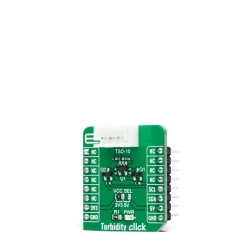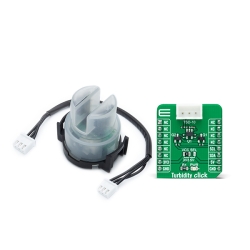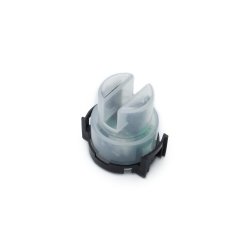MIKROE Turbidity Click
MIKROE Turbidity Click is an adapter Click board™, used to interface a compatible turbidity sensor with the host MCU.
Product Overview
MIKROE Turbidity Click is an adapter Click board™, used to interface a compatible turbidity sensor with the host MCU. This board features one 1x3 2.5mm connector suitable for connecting a Turbidity sensor via an additional 3-wire Male to Male Cable - 15 cm for Turbidity Click specially made for this purpose. It allows users to upgrade their projects with a sensor that senses the cloudiness or haziness of a fluid caused by large numbers of individual particles invisible to the naked eye. This sensor also measures temperature as well as turbidity.
Turbidity Click is supported by a mikroSDK compliant library, which includes functions that simplify software development.
NOTE: This product does NOT come with a Turbidity sensor or cable.
Turbidity Click is an adapter Click board™ that simplifies the interface of the Turbidity Sensor with the host MCU. This Click board™ represents a small-size PCB that can be connected to the mikroBUS™ socket like any other Click board™, with a 1x3 2.5mm pitch vertical type board connector placed on itself used for the turbidity sensor connection. Each of the connector pins corresponds to a pin of the turbidity sensor. Each of the connector pins corresponds to the turbidity sensor pins connected to this same connector via an additional 3-wire cable for Turbidity Click, specially made for this purpose. This way allows easy pin access and manipulation while retaining a perfect connection quality at all times.
This Click board™ allows users to upgrade their projects with a sensor that senses the cloudiness or haziness of a liquid caused by large numbers of individual particles invisible to the naked eye. The turbidity level is determined based on a comparison between clean water measurements and later based on the used water at the end of usage; more precisely, the turbidity sensor measures the amount of transmitted light to determine the turbidity of the liquid. As well as turbidity, this sensor also measures liquid temperature.
The analog output voltage of the Turbidity Sensor can be converted to a digital value using MCP3221, a successive approximation A/D converter with a 12-bit resolution from Microchip, using a 2-wire I2C compatible interface. Using MCP3221 and I2C interface, data transfers at rates of up to 100kbit/s in the Standard and 400kbit/s in the Fast Mode.
This Click board™ can operate with both 3.3V and 5V logic voltage levels selected via the VCC SEL jumper. This way, it is allowed for both 3.3V and 5V capable MCUs to use the I2C communication lines properly. However, the Click board™ comes equipped with a library containing easy-to-use functions and an example code that can be used, as a reference, for further development.
Features & Specs
- Interface: I2C
- Compatibility: mikroBUS™
- Dimensions: 28.6 x 25.4mm
- Input Voltage: 3.3V or 5V
- Nephelometric Turbidity Unit: Min. 0 NTU, Max. 4500 NTU
- Operating Temperature Range: Min. -10°C, Typ. +25°C, Max. +90°C
Documentation
Customer Reviews

Stock and Customer Discounts
Available Discounts
- $5.65 | 25+ units
- $5.36 | 100+ units




